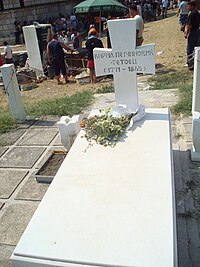Kiril Peychinovich
Located in the region of Torbešija (Торбешия or Торбешија) along the valley of the Markova Reka (Marko's River) among Torbesh, Turkish and Albanian villages, the monastery was in a miserable condition before Peychinovich's arrival.In 1818 Peychinovich once again travelled to Mount Athos to see his father and uncle, and then became hegumen of the Monastery of Saint Athanasius (destroyed in 1710 by Janissaries) near the Polog village of Lešok in the proximity of his native Tearce.Kiril Peychinovich is the author of three books, two printed and one manuscript (Zhitie i Sluzhba na Tsar Lazar), all three devoted to religion.It is an original work, inspired by the Kolivari (also called Filokalist) movement on Mount Athos, that was fighting for a liturgical renewal within the Eastern Orthodox Church on the Balkans.[3][4][5] According to the book's title page, it was written in the 'most common and illiterary Bulgarian language of Lower Moesia' ('препростейшим и некнижним язиком Болгарским долния Мисии').Теарце му негово рождение Пречиста и Хилендар пострижение Лешок му е негоо воспитание Под плочава негоо почивание От негово свое отшествие До Христово второ пришествие Молит вас бракя негои любимия Хотящия прочитати сия Да речете Бог да би го простил Зере у гроб цръвите ги гостил Овде лежи Кирилово тело У манастир и у Лешок село Да Бог за доброе дело.




TearceOttoman EmpireLešokBulgarianSerbianMacedonianChurch SlavonicBulgarian National RevivalNorth MacedoniaMonastery of St. John BigorskiHilandarMount AthosTetovoKičevo MonasteryTheotokoshieromonkhegumenMarko's MonasterySaint DemetriusSkopjeMarkova RekaTorbeshTurkishAlbanianBudapestSaint AthanasiusJanissariesBulgariansLešok Monasteryprinting pressTeodosiy SinaitskiThessalonikiEastern Orthodox ChurchBalkansChristianBulgarian languageMoesiaBelgradeTheodosius of SinaiepitaphRuse ProvinceBulgariaethnic MacedonianMacedonian literatureMacedonian Orthodox Church